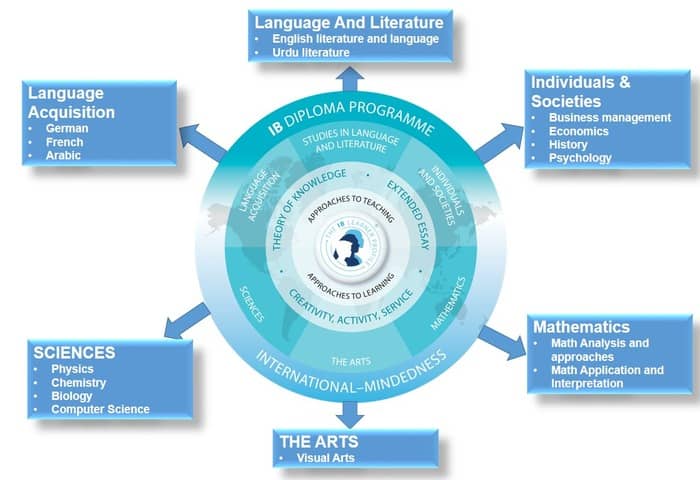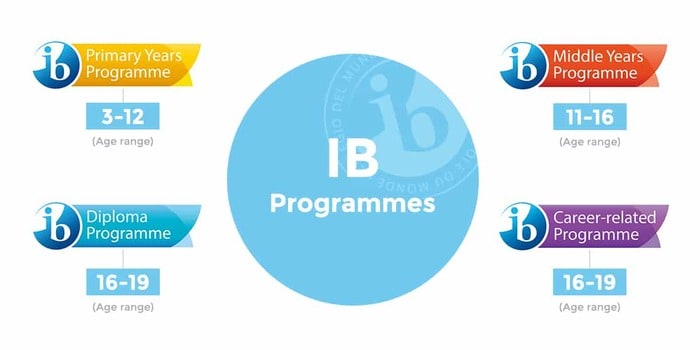The International Baccalaureate (IB) curriculum is one of the longest-running and most renowned international education systems. It was founded in Switzerland in 1968 and is currently taught across 140 countries in over 3,000 schools globally. It follows a student-centric approach to learning guided by expert educationalists that emphasize creativity, problem-solving, and critical thinking skills.
The International Baccalaureate Diploma is a two-year curriculum that is a part of the more extensive IB curriculum. The IB diploma program is well-recognized and amongst the most popular education systems worldwide. It is transferable across countries and helps students better prepare for university because the well-defined standards of this program hold students answerable for their work.
Schools from Singapore to Spain offer the IB Diploma program as it is the perfect avenue to provide children with a first-class education. These schools offer the IB program, which puts kids at an advantage compared to other kids, better preparing them for success at university and the later stages of life.
The IB Diploma Programme is one of the most coveted innovative curriculums for high-achieving high school students that is widely offered in schools in Singapore. Here is everything you need to know about the IB Diploma Programme.

What is the International Baccalaureate Organisation?
The International Baccalaureate Organisation has its headquarters in Geneva, Switzerland. The IB Diploma Programme is offered to high school students amongst three other programs for different age groups. The Primary Years Programme for students between the ages of 3 and 12, the Middle Years Programme for 11 to 16 years and the Career-Related Programme were the last to debut.
Why should one consider the IB Programme?
The primary reason to consider the IB Diploma program is that it is recognized globally. The idea behind this program is that no matter what country the student comes from or where they go to study, the curriculum will be standard through high school.
When IB diploma students apply for universities and other higher education institutes, they will know precisely what the applicant’s high school curriculum involves.
How does one join the IB Programme?
Numerous schools, especially international schools in Singapore, offer the International Baccalaureate Programme, which is a two-year program for eligible seniors and juniors. Usually, high schools allow students with a specific grade point average who have taken certain preparatory freshman and sophomore classes to partake in the program.
However, each school may have a specific requirement for admission into the IB diploma program. It is best to check out the school’s website or speak to a guidance counselor to understand the eligibility criteria for this program.
What subjects does the IB Diploma Programme entail?
Students pursuing the IB Diploma Programme are required to study these six subject areas: Language Acquisition, Math, Language and Literature, Science, Individuals and Societies, and Arts.
- Language and Literature: Language A – Language and Literature, Language A – Literature, Literature and Performance.
- Language Acquisition: Language Ab Initio (beginner’s language), Language B (intermediate language), Classical Languages.
- Individuals and Societies: Social and Cultural Anthropology, Geography, Psychology, World Religions, Economics, Philosophy, Business Management, Global Politics, History, and Information Technology in a Global Society.
- Science: Chemistry; Biology; Physics; Environmental Systems and Societies; Computer Science; Sports, Exercise, and Health Science; Design Technology.
- Maths: Mathematical Studies (standard level), Mathematics (standard level), Mathematics (higher level), Further Mathematics (higher level).
- The Arts: Dance, Film, Music, Visual Arts, Theatre
- In addition to classes from the above six subjects, students need to fulfill three other requirements as well.
- Extended Essay: This 4000-word essay is to be written on a self-chosen and self-directed research project related to one of the six core subjects
- The Theory of Knowledge (TOK): It entails a 1600-word essay and a verbal presentation that requires students to reflect on what learning really encompasses.
- Creativity, Activity, Service (CAS): These comprise projects that involve volunteer service, physical activity and creativity, which are necessary but not graded. It ensures the growth of the student within the classroom as well as beyond.
The classes are accessible at two levels: standard level and high level – the former requires 150 hours of instruction and delves deeper into the topics. The latter requires 240 hours of instruction. In a single academic year, students in the IB diploma program need three or four higher-level classes, and the remaining classes can be standard.
Can one take an IB class without formally enrolling in the IB Programme?
Students who do not care about getting an IB diploma but want to take a few IB courses may be allowed to do so if they meet the prerequisites for the selected classes. Once they complete the course, they can take the test to earn potential college credit. The school’s guidance counselor can give complete clarity about it.
Students can take the IB exam if they have completed that particular course. They needn’t necessarily have enrolled in the IB diploma program. Scores from these individual IB exams are not part of the overall average score of the student but can be presented individually to a college to highlight competitiveness in that particular subject area.

How are IB exams graded, and what is the nature of these exams?
IB exams are graded between 1 and 7, and each subject grade is averaged, so the final score ranges from 1 to 7. These are added to give the overall score obtained. In addition to these 42 points, 3 points come from the Extended Essay and TOK.
Thus, the highest total a student can obtain is 45 and below 24 points means the student has failed certain subjects. If a student receives 1 in either of the six subjects, they have essentially failed that course and will not obtain an IB diploma.
What is the cost of taking an IB exam?
Unfortunately, taking an IB exam has a charge associated with it. Students must pay US$172.00 for the exam registration and an additional charge of 140.00 SGD per subject they sign up for.
All international schools offer the IB diploma program, and the international school fees in Singapore vary from school to school. Some students are eligible for fee waivers and should contact their guidance counselors or IB coordinators to understand the possibility of free testing or reduced fees.